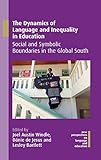The Dynamics of Language and Inequality in Education : Social and Symbolic Boundaries in the Global South / ed. by Joel Austin Windle, Dánie de Jesus, Lesley Bartlett.
Material type: TextSeries: New Perspectives on Language and EducationPublisher: Bristol ; Blue Ridge Summit : Multilingual Matters, [2020]Copyright date: ©2020Description: 1 online resourceContent type:
TextSeries: New Perspectives on Language and EducationPublisher: Bristol ; Blue Ridge Summit : Multilingual Matters, [2020]Copyright date: ©2020Description: 1 online resourceContent type: - 9781788926942
- 9781788926959
- 306.44 23
- P40.85.D44 D96 2020
- P40.85.D44
- online - DeGruyter
- Issued also in print.
| Item type | Current library | Call number | URL | Status | Notes | Barcode | |
|---|---|---|---|---|---|---|---|
 eBook
eBook
|
Biblioteca "Angelicum" Pont. Univ. S.Tommaso d'Aquino Nuvola online | online - DeGruyter (Browse shelf(Opens below)) | Online access | Not for loan (Accesso limitato) | Accesso per gli utenti autorizzati / Access for authorized users | (dgr)9781788926959 |
Frontmatter -- Contents -- Contributors -- Introduction: The Dynamics of Language and Inequality -- Section 1: The Shifting Boundaries of Linguistic Inequality -- 1. Across Linguistic Boundaries: Language as a Dimension of Power in the Colonization of the Brazilian Amazon -- 2. Navigating Soft and Hard Boundaries: Race and Educational Inequality at the Borderlands -- 3. Rural-Urban Divides and Digital Literacy in Mongolian Higher Education -- Section 2: Language, Ideology and Inequality -- 4. A Cycle of Shame: How Shaming Perpetuates Language Inequalities in Dakar, Senegal -- 5. The Role of Shame in Drawing Social Boundaries for Empowerment: ELT in Kiribati -- 6. Native-speakerism and Symbolic Violence in Constructions of Teacher Competence -- 7. Knowledge Politics, Language and Inequality in Educational Publishing -- 8. Decoloniality and Language in Education: Transgressing Language Boundaries in South Africa -- 9. Queering Literacy in Brazil's Higher Education: Questioning the Boundaries of the Normalized Body -- 10. 'Saudi Women Are Finally Allowed to Sit Behind the Wheel': Initial Responses from TESOL Classrooms -- Multilingual Abstracts -- Index
restricted access online access with authorization star
http://purl.org/coar/access_right/c_16ec
This book contributes new perspectives from the Global South on the ways in which linguistic and discursive boundaries shape inequalities in educational contexts, ranging from Amazonian missions to Mongolian universities. Through critical ethnographic and sociolinguistic analysis, the chapters explore how such boundaries contribute to the geopolitics of colonialism, capitalism and myriad, interwoven, forms of social life that structure both oppression and resistance. Boundaries are examined across time and space as relational constructs that mark the terms upon which admission to groups, institutions, territories, or practices are granted. The studies further present alternative educational approaches that demonstrate the potential for agency and transgression, highlighting moments of boundary crossing that disrupt existing linguistic ideologies, language policies and curriculum structures.
Issued also in print.
Mode of access: Internet via World Wide Web.
In English.
Description based on online resource; title from PDF title page (publisher's Web site, viewed 24. Apr 2022)


